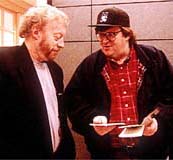Early Bird Deadline Is Tomorrow
Does your documentary speak beyond the choir?
Before I explain how to keep skeptics watching your film, and why your documentary needs a “detractor“, first an important announcement:
The early-bird deadline to register for the Inner Circle and save money is tomorrow, Friday, April 20th. Please contact me if you are interested in joining this 6-month program. We’ve been attracting several very talented filmmakers lately, as well as some passionate, emerging filmmakers! Learn more at:
https://newdocediting.com/land/innercircle
Now back to reaching beyond the choir. How do you keep skeptics watching your film?
Give them a credible spokesperson. Not a straw man that you’ll knock down, but a credible, even likable expert who can articulate the opposing viewpoint. As filmmaker Bill Jersey says, “Make the bad guys look good.”
As you probably know, for character-driven films, the “detractor” or bad guy comes in the form of the antagonist, the person who thwarts the protagonist’s goal.
But what about topic-driven films? In documentaries that are structured around ideas rather than a character’s quest, the detractor is likely to be a talking head expert–but not always.
For example, check out the detractor in Michael Moore’s film “The Big One”. This little known documentary “has the president of Nike giving Michael Moore a run for his money in a one-on-one,” says filmmaker Jon Else, head of the documentary program at UC Berkeley, where I teach editing. Else also uses “Crumb” in his documentary classes as an example of feminist detractors pushing back against the protagonist.
This “pushback” factor could have kept some viewers watching the controversial documentary “Thrive”. This recent internet hit has turned off and alienated many viewers (even before the film got to the juicy “thriving” section) by advancing UFO evidence and conspiracy theories.
If the directors Steve Gagne and Kimberly Carter Gamble had featured a detractor voice that debunked UFO’s and conspiracy theories, in essence calling Foster Gamble’s ideas ridiculous, two important outcomes would have worked in the filmmakers’ favor.
First, the counter view would have amped the film with tension, riveting the viewer.
Second, this detractor voice would have kept skeptical viewers engaged.
Some of those doubtful viewers (myself included) kept watching the documentary anyway. And I found it ultimately inspiring. But I imagine most skeptics had already formed their judgment about the film before it was halfway through. And most of those viewers probably stopped watching.
What if “Thrive” had featured a detractor saying, “Gamble is just advancing another paranoid conspiracy theory”?
Skeptical viewers would have said to themselves, “Right on!” And not only might they have felt validated but even more importantly their minds could then relax and open to the ideas being discussed.
This is the true value of a detractor.
I recently suggested that my Inner Circle client Michael Dunaway add a detractor to his humorous essay-style film “The Man Who Ate New Orleans.”
After watching his rough cut, I saw that the best way to make the case for rebuilding New Orleans was to butt his arguments up against a detractor’s voice, who would counter that New Orleans was not worth rebuilding into a world-class city. Michael and I discussed several ways to bringing in the detractor voice, from animation to a talking head/expert to an antagonist character in his film.
If you are interested in learning more about how to structure documentaries that preach beyond the choir, consider joining my upcoming Inner Circle, beginning April 30th.
Here’s Michael Dunaway’s testimonial about his experience in the Inner Circle:
“It’s exciting enough that Karen has assembled a group of such talented and accomplished filmmakers, which turns the Inner Circle into an invaluable peer group. Karen’s own expertise and insight into my films have helped me immeasurably as well. But probably the most important aspect of the class is the environment of encouragement and exhortation Karen creates. The Inner Circle has given me an ideal incubation ground for my documentaries, and I’d highly recommend to any filmmakers interested in making their films great.”
The early bird deadline ends tomorrow, and the Inner Circle is filling up fast! I encourage you to act today because the last two Inner Circles sold out, and I’m only accepting six filmmakers.
To help you make a decision, please feel free to email me so you can get a clear idea of how the Inner Circle can benefit you. Also learn more at:
